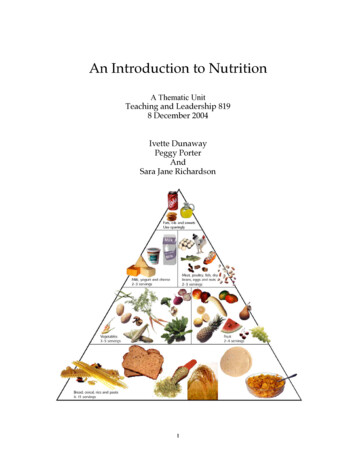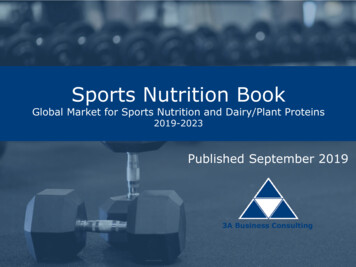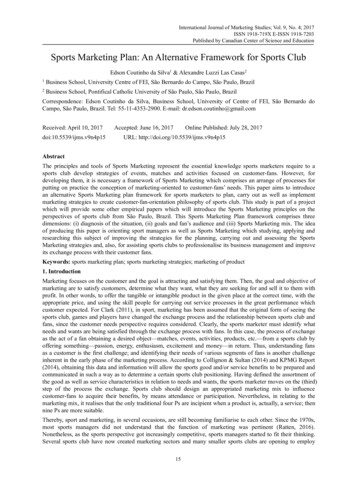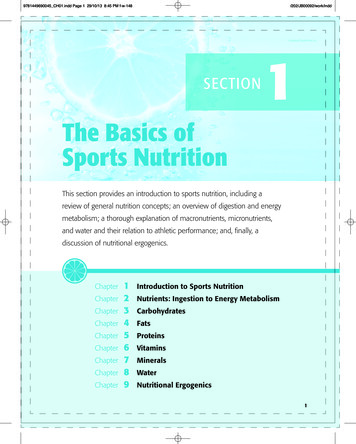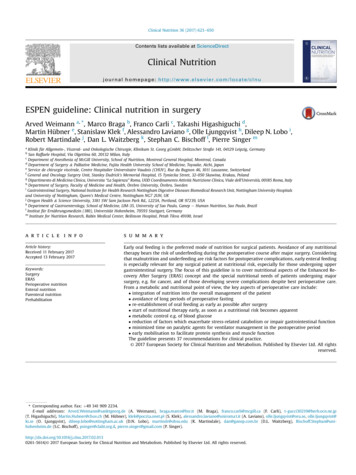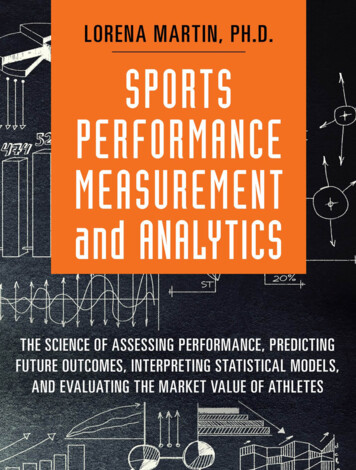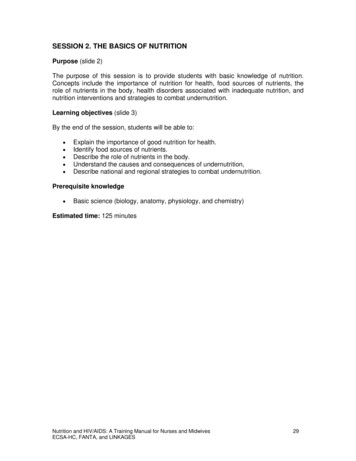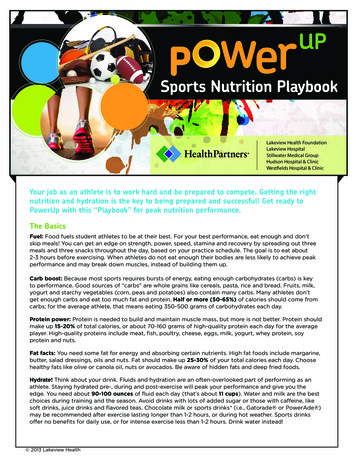
Transcription
Sports Nutrition PlaybookLakeview Health FoundationLakeview HospitalStillwater Medical GroupHudson Hospital & ClinicWestfields Hospital & ClinicYour job as an athlete is to work hard and be prepared to compete. Getting the rightnutrition and hydration is the key to being prepared and successful! Get ready toPowerUp with this “Playbook” for peak nutrition performance.The BasicsFuel: Food fuels student athletes to be at their best. For your best performance, eat enough and don’tskip meals! You can get an edge on strength, power, speed, stamina and recovery by spreading out threemeals and three snacks throughout the day, based on your practice schedule. The goal is to eat about2-3 hours before exercising. When athletes do not eat enough their bodies are less likely to achieve peakperformance and may break down muscles, instead of building them up.Carb boost: Because most sports requires bursts of energy, eating enough carbohydrates (carbs) is keyto performance. Good sources of “carbs” are whole grains like cereals, pasta, rice and bread. Fruits, milk,yogurt and starchy vegetables (corn, peas and potatoes) also contain many carbs. Many athletes don’tget enough carbs and eat too much fat and protein. Half or more (50-65%) of calories should come fromcarbs; for the average athlete, that means eating 350-500 grams of carbohydrates each day.Protein power: Protein is needed to build and maintain muscle mass, but more is not better. Protein shouldmake up 15-20% of total calories, or about 70-160 grams of high-quality protein each day for the averageplayer. High-quality proteins include meat, fish, poultry, cheese, eggs, milk, yogurt, whey protein, soyprotein and nuts.Fat facts: You need some fat for energy and absorbing certain nutrients. High fat foods include margarine,butter, salad dressings, oils and nuts. Fat should make up 25-30% of your total calories each day. Choosehealthy fats like olive or canola oil, nuts or avocados. Be aware of hidden fats and deep fried foods.Hydrate! Think about your drink. Fluids and hydration are an often-overlooked part of performing as anathlete. Staying hydrated pre-, during and post-exercise will peak your performance and give you theedge. You need about 90-100 ounces of fluid each day (that’s about 11 cups). Water and milk are the bestchoices during training and the season. Avoid drinks with lots of added sugar or those with caffeine, likesoft drinks, juice drinks and flavored teas. Chocolate milk or sports drinks* (i.e., Gatorade or PowerAde )may be recommended after exercise lasting longer than 1-2 hours, or during hot weather. Sports drinksoffer no benefits for daily use, or for intense exercise less than 1-2 hours. Drink water instead! 2013 Lakeview Health
Sports Nutrition GuideDifferent sports require different combinations of endurance, intensity, power and strength. This guide can helpyou plan to get the right balance of fuel and hydration for top sports performance. (This grid is based on anaverage size player with a typical practice schedule. Players may need more or less, depending on size, activityand individual needs.)Type of SportDaily CaloriesCarbs (gramsper pound ofbody weightper day)Protein (gramsper pound ofbody weightper day)ExamplesDaily Hydration*Endurance Sports(Running, distancecycling, triathlons,Nordic skiing)Calorie needsdepend onweight andactivity level.3.6-4.5grams/lb.0.5-0.6 grams/lb.Girls Cross CountryRunner: EnduranceSport90-100 ounces offluid*Weight: 120 lbs.Girls usuallyneed about2400-3000calories perday.High Intensity,Power, andStrength Sports(Soccer,swimming,volleyball, lacrosse,basketball, hockey,gymnastics,football, sprinting,wrestling, baseball,tennis)Boys usuallyneed 28003500 caloriesper day.Carbohydrates:120 x 3.6-4.5 gms/lb. 432-540 gms/ dayProtein:120 x 0.5-0.6 gms/lb. 60-72 gms/day2.3 grams/lb.0.6-0.8 grams/lb.Boys BasketballPlayer: High IntensitySportWeight: 180 lbs.Based onactivity andsize, athletesmay needup to 5000calories a day.Carbohydrates:180 x 2.3 gms/lb. 414 gms/day 16 oz. first thingin the morning. Water throughoutthe day. 24-48 ounces ofwater per hour ofpracticeDrink another 24ounces of fluid forevery pound lostduring exercise.Weigh-in beforeand after heavypractices or in hotweather.Protein:180 x 0.6-0.8 gms/lb. 108-144 gms/day.*Fluids include primarily water and milk, with some chocolate milk orsports drinks after exercise. Sports drinks are not for meals but for afteror during exercise greater than 1-2 hours per day and/or hot weather.Water is best for shorter exercise sessions. Drinks with caffeine are notrecommended and do not count toward your fluids because they can havea dehydrating effect on your body. Caffeine can also affect your sleep andmake you jittery or anxious, which may negatively affect your performance.Note: Heavy training—more than 2 hours of intense workouts a day (or“two a days”)—increase an athlete’s need for carbohydrates, calories andfluid. During these heavy training periods, athletes may need up to 700900 grams of carbohydrate and more than 3,000 calories. 2013 Lakeview HealthTo get enough, besure to drink:80/20 Rule:Great news, you don’thave to have to be perfectto eat well for sports! Strive tomake at least 80% of the foodsyou eat healthy and power-packedwith nutrition. There is a little roomfor sweets, treats, or less nutritioussnacks. Just keep it to 20% or lessof what you eat. It’s a matter ofbalance and moderation!2
Meal and Snack Ideas for Busy AthletesMeal Ideas for AthletesTimingMeal/SnackExamples4-5 hours before eventBigger meal with 200-300 grams ofcarbs and 20-30 grams of protein.2 cups whole grain pasta1 cup marinara sauce with meat1 bread stick1 cup veggie of choice1 apple or 1 cup of fruit16 oz. low-fat or skim milk2-3 hours before eventLighter meal with 30-40 grams of carbsand protein.Turkey, tuna or chicken breastsandwich/subFruit water1/2-1 hour before eventSnack with 15-30 grams of carbs and notmuch protein or fat (as they take longerto digest)Pretzels and waterAfter the eventSnack with generous amount of fluidand carbsWater, milk/chocolate milk, sportsdrinks** with crackers or fruit.See page 5 for a sample menu for one day.Protein Supplements?PowerUpYour Training Plate!To get the right fuel for sports,you need balance, with extra carbsand protein.So, fill your plate with:1/3 protein foods like:Turkey, fish, chicken, meat,eggs, cheese, or nuts.2/3 high carb foods like: Whole grains (rice, bread, pasta) Fruits and veggies (including starchyveggies like peas, potatoes, corn). Drink milk with meals for morehigh-quality carbs and protein.Specialized protein supplementsand shakes are expensive and not alwayshelpful. By eating more protein in foods suchas meats, fish, eggs, cottage cheese, milk, yogurt,you should be able to meet all your protein needs.Remember: don’t overdo the protein—it makes yourkidneys work too hard! If you can’t get enough proteinfrom food, some athletes supplement with protein shakesor powders. For any protein supplement check the label forwhey or soy protein which safe in moderation. Beware ofcreatine, however, which claims to improve performance,but those claims have not been proven. The AmericanAcademy of Pediatrics says that these types ofsupplements pose serious risks to your health(hydration, kidneys and more). They should notbe used by teens or kids. Be supplementsavvy and get your protein from food,and be sure to avoid creatine.3 2013 Lakeview Health
Tips and Tricks to PowerUp AthletesBreakfast. Don’t leave home without it.Getting some carbs and protein doesn’t have to becomplicated. Aim for simple foods like: Carnation Instant Breakfast Drink*A smoothie made with fruit and yogurtPeanut butter toast and milkSnack AttacksRemember to eat a post-exercise snack within30 minutes after you exercise or have a game.This helps restore the energy stored in yourmuscles (called glycogen). Make your snacks countwith a combination of protein and carbohydrate.Examples: A quick recipeanyone can make!No Bake Energy BitesThese delicious little energy bites are the perfecthealthy snack!Ingredients: 1 cup old fashioned oats 1/2 cup peanut butter, almond butteror sunflower seed butter 1/2 cup ground flaxseed or wheat germ 1/2 cup dried fruit 1/3 cup honey 2/3 cup toasted coconut flakes (optional) 1 tsp. vanilla extractDirections:Stir all ingredients together in a medium bowl untilthoroughly mixed. Let chill in the refrigerator for half anhour. Once chilled, roll into balls about 1” in diameter.Store in an airtight container and keep refrigeratedfor up to 1 week. Makes about 20-25 balls.Nutrition information for one energy ball:100 calories, 9 grams carbohydrate,3 grams of protein, 2 gramsof fiber.Cheese or cottage cheese with fruit or crackersPeanut butter sandwichYogurt and fruitBanana with nut butterTrail mix with fruit and nutsBeans (refried or black beans) and cheese tortilla rollup with salsaHardboiled egg with toastCereal and milkAFTER TRAINING, DRINK WATER, plus 8-12 ounces of chocolate milk or sports drinks* to rehydrate and restore.Want to Gain Weight? Eat small frequent meals throughout the day—aim for 3 meals and 3 snacks daily. Don’t skip breakfast.Drink high calorie and nutrient-rich beverages, such as Carnation Instant Breakfast, Boost or SmoothiesAdd extra cheese, peanut butter or other healthy protein foods and fats.Want to Lose Weight?Wait until after the season! The focus of training is to get ready for upcoming games; trying to lose weight willtake energy away from your performance. Here are some suggestions: Don’t restrict carbohydrates; you need them for energy Don’t skip meals; just decrease portion sizes Drink water instead of sweet soft drinks, tea and juices. Include more protein foods, fruits and vegetables to help satisfy hunger and important nutrients Limit fast foods and avoid super-sizing Eat food from a plate, not out of original container4 2013 Lakeview Health
Sample 1 Day 3000-3300 Calorie Meal for r, 16 ouncesBreakfastSnack16Milk (1%), 8 ounces100128Whole grain bagel with peanut butter (2 Tbsp.)4956314Banana (large)12030Trail mix, 1 ounce140138Whole grain bread, 2 slices with and 1 ounce cheese160306Turkey, 3 ounces16521Cheese, natural, 1 ounce1008Lettuce, tomato and spreads50Apple, large11026Tortilla or Sun Chips, 1 ounce140183Milk (1%) , 8 ounces100128Water, 8 ouncesSnackCrackers with nut butter19023Grapes, handful10528816Grilled pork chop, chicken or lean steak, 5 ounces30035Whole grain pasta, 2 cups3209012Stir fried vegetables, 1 cup5062Whole grain dinner roll100163Berries, 1 cup8020Milk (1%), 8 ounces100128Water, 8 ouncesSnack882 cups Cheerios220446Milk (1%), 8 ounces100128Raisins, 2 Tbsp.8520Water, 8 ouncesTOTAL88Water, 16 ouncesDinner86Water, 8 b156gramsprotein96ouncesfluidTo make a personalized meal plan based on your weight and activity level: visit on your computer or smart phone: www.myfitnesspal.com www.calorieking.com Meet with a registered dietitian for a more specific meal plan to meet your nutrition needs. Check withyour school’s health office or HealthPartners clinic for availability.5 2013 Lakeview Health
Finding Carbohydrates and ProteinTo help you determine how much carbohydrate and protein a food has, first use the label (if it has a label);otherwise, use the guide below of common foods to help guide you to meet your needs.Carbohydrate-Rich FoodsRemember, when it comes tograins, whole grains like wholegrain bread or pasta, or brownrice are your best choice!Carbs(grams)Pasta (1 cup cooked)Protein–Rich FoodsProtein(grams)Chicken Breast (3 ounces)2640Pork Chop25Rice (1 cup cooked)45Hamburger Patty (3 ounces)24Whole Wheat Bread (1 slice)14-25Tuna (3 ounces)206” Sub Sandwich38-48Turkey (3 ounces)2812” Sub Sandwich94-120Fish (4 ounces)28Flour Tortilla 8”26Yogurt (8 ounces)5-10Corn Tortilla 6”11Greek yogurt (6-8 ounce)14Bagel (Large)56-65Cottage Cheese (1/2 cup)13Hamburger Bun30String Cheese (1 oz.)8Breakfast Cereal (Varies) 1 cup19-48Egg ( 1 Large)6Crackers (Varies)12-30Peanut butter (2 tablespoons)8Baked Potato (1 Large)60Sunbutter (sunflower seeds) (2 Tbsp.)6Mashed Potatoes (1 cup)30Tofu (4 ounces extra firm)8Corn or Peas (1 cup)30Bocca Burger (1 patty)13Orange (Large)33Baked Beans (1 cup)13Apple (Large)26Almonds (1 ounce)6Banana (Large)30Milk, low-fat ( 8 ounces)9Grapes (1 cup)30Whey Protein (1 ounce)25Broccoli , Steamed (1 cup)8Black beans, Kidney beans, Garbanzo bean orrefried beans (1 cup)158 oz. milk12Greek yogurt24Regular yogurt20Sports Drink (20 oz.)33Sports Bars24-48(3 ounces)References:American Dietetic Association, nutrition pamphlet, “Winning sports nutrition: the athlete’s guide to healthful eating. 2005.Sports Nutrition, A Practice Manual for Professionals, 4th Edition, American Dietetic Association, 2006.Academy of Nutrition and Dietetics, Nutrition Tips for Coaches of Teen Athletes. 2012Sports, Cardiovascular and Wellness Nutrition, Nutrition Fact Sheets, Issue 16, 2012 2013 Lakeview Health6
Fuel up with the Right AmountGIRLS: Average girl athlete needs 2400-2800 calories a day (varies based on individual and sport)BOYS: Average boy athlete needs 2800-3500 calories a day (varies based on individual and sport)DIFFERENT SPORTS REQUIRE DIFFERENT CALORIE NEEDS?SPORTESTIMATED CALORIES BURNED PER HOURBaseball or SoftballBasketballCross Country Runners300-400 calories per hour400-600 calories per hour100 calories per mile they runNote: Running Marathons and Triathlons burns morecaloriesFootballGolfing – carrying a bagGolfing – riding in a cartHockeyLacrosseFootballMountain Bike RacingSkiing - AlpineSkiing - Nordic500-700 calories per hour230-350 calories per hour125-200 calories per hour600-900 calories per hour500-730 calories per hour500-700 calories per hour480-700 calories per hour400-600 calories per hour400-600 calories per hourNote: Skiing uphill may burn up to 800 calories per hourSoccerSwimming – CompetitiveSwimming – SynchronizedTennis – Singles MatchTennis – Doubles MatchVolleyballWrestling (1 match 5 minutes) 2016 Lakeview Health500-700 calories per hour600-800 calories per hour500-700 calories per hour450-700 calories per hour300-500 calories per hour350-550 calories per hour350-545 calories
POWER YOUR PLATE FOR SPORTSTo perform at your best, it’s important to get a balance from most (if not all) of the food groups at every meal. Apple Berries Banana Oranges Mango Watermelon Pineapple Whole grainbread/waffles/cereal Whole grain waffles Whole grain pasta Brown/Wild Rice Quinoa Corn TortillaFruitVeggiesGrainsProtein Broccoli Greens/Lettuce Green Beans Carrots Jicama Sweet Peppers Starchy Vegetables(corn, peas, potatoes) Meat, poultry, fish Beans/legumes Nuts/seeds/nut butters Eggs Milk/cheese/cottagecheese/yogurt (fits intoprotein & dairy group)Every meal and snack, include: CARBOHYDRATE which can come from fruit, veggies, grains, milk or yogurt to boost your energy.PROTEIN to help satisfy hunger, build and maintain muscle and balance out energy needs.Fat is found naturally in foods (like meat, nuts, eggs, cheese), and even some veggies, like avocado andolives. When it comes to fat, the goal is to choose “healthy” fats like olive or canola oil, olives, avocado, ornuts/seeds. WATER at least 8-16 ounce (1-2 cups) at meals, with goal of 90-100 ounces (11-12 cups) a day, dependingon activity and individual needs. Staying hydrated will peak your performance and give you the edge. 2016 Lakeview Health
Sample Meal Ideas for AthletesBREAKFASTWhole grain EnglishMuffin with nut butterFruit and/or veggie1 cup milk or yogurt8-16 oz water8801-2 eggs (or omeletwith veggies)1-2 whole grain toastFruit and/or880veggie1 cup Milk or yogurt8-16 oz WaterFruit Yogurt Parfait-1 cup Greek yogurt-1/4-1/2 cup granola-1 cup berries8-16 oz water880Fruit Smoothie1-2 whole grainwaffles with nut butter8-16 oz water880LunchHam/Turkey CheeseWrap or Sub w/lettuceFruit - orangeVeggie – Jicama1 oz bag whole grainchips (Sun chips)1 cup milkor yogurt88016 oz waterSchool Lunch:- Protein- Veggie Fruit-Whole Grain8801 cup milk or yogurt16 oz waterSalad/Greens with:- 2 hard-boiled eggs orother protein (chicken,black beans, cottagecheese, nuts/seeds)- Fruit: berriesWhole grain crackers1 cup milk or yogurt16 oz water2 cups pasta (wholegrain) with tomato pastasauce3 oz protein (hamburger,shrimp, chicken,880 etc.)Veggie Fruit1 cup milk16 oz water or more1-2 Tacos (corn orwhole grain tortillas)with choice of protein(chicken, beef, fish,beans, cheese)Veggies: lettuce, salsa,avocado/guacamole1 cup milk16 oz water or moreNut Butter or TunaSandwich (on wholegrain bread orcrackers)Veggie Fruit1 cup milk or yogurt16 oz waterDinner3-4 oz proteinBaked potato w/plainGreek yogurtBrown/wild riceVeggie/Salad Fruit1 cup milk88016 oz wateror more1-2 cupsCasserole/LasagnaSalad/VeggieFruit1 cup milk16 oz water or moreSnack (1-2 Carb choices 1-2 ounces Protein)Fruit and/or veggie¼-1/2 cup trail mix(dry whole graincereal, dried fruit,nuts/seeds)880 Health8-16Lakeviewoz water 20161-2 ozcheese/natural orstring4-8 Whole grain880crackersFruit and/or veggie8-16 oz waterHummus or Nutbutter w/crackersFruit and/or veggie1 cup milk8-16 oz waterFruit –Nut orProtein BarFruit and/or veggie8-16 oz water
MEALS: HOW MUCH? HOW OFTEN?To reach your peak performance and balance your nutritional needs each day, it’s important that byafternoon practice time most athletes should have eaten at least: 2 meals2 snacks48 ounces (6 cups) of waterAt least 1,000 calories (from a variety of foods)This means eating the following before your athletic event OR afternoon practice!ooooBreakfastMorning snackLunchAfternoon snack 2016 Lakeview Health
ON THE ROAD WITH SPORTS!Traveling Tips for Eating:Choose:oooooooGrilled Chicken SandwichWraps with lean meat or veggie and beans and/or cheeseSub sandwiches with plenty of veggiesPasta dishes with chicken or shrimp with veggies and tomato-based pasta saucePeanut or nut butter sandwiches with fruitBaked potato topped with cheese & broccoli/veggie, chili or cottage cheeseMilk and/or WaterLimit or Avoid:ooooFried foodSpicy foods (may upset stomach and cause irritation)Heavy fat foods (like chips, fries, hamburgers, etc.)Sugary drinks (like soda, large amounts of sports drinks, or other sugary drinks)Pack (and bring along):ooooooFruit and/or raw veggiesCheese or nut butter with whole grain crackersProtein or fruit-nut barsTrail mix with dried fruitEnergy bites (see recipe included)Extra waterProper nutrition all year long will lead to a more SUCCESSFUL TEEN on and off the field! 2016 Lakeview Health
Sports Nutrition Playbook. Your job as an athlete is to work hard and be prepared to compete. Getting the right nutrition and hydration is the key to being prepared and successful! Get ready to . PowerUp with this “Playbook” for peak nutrition performance. The Basic
